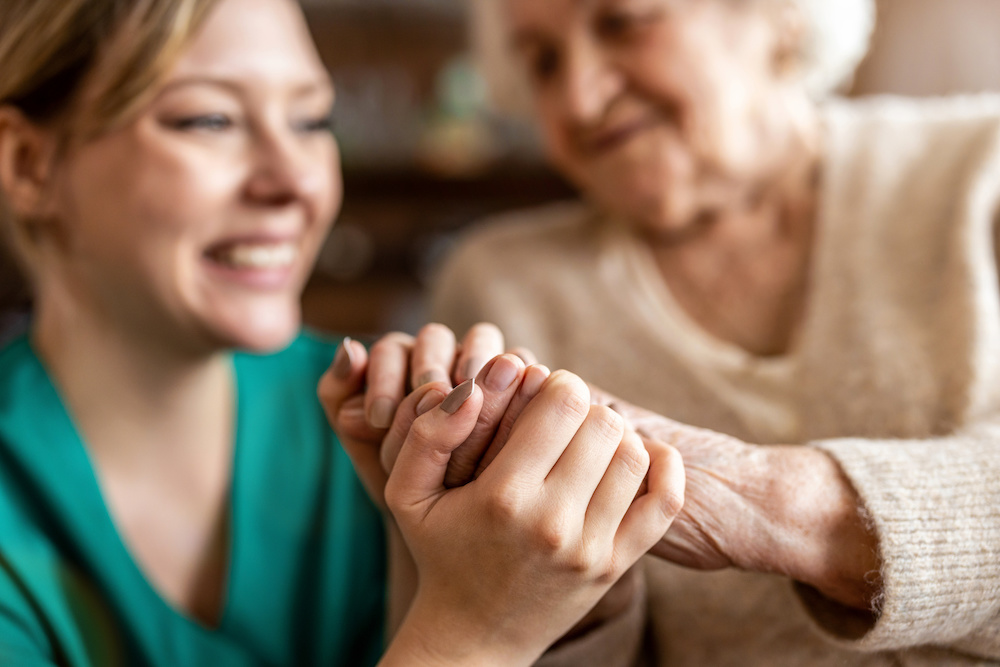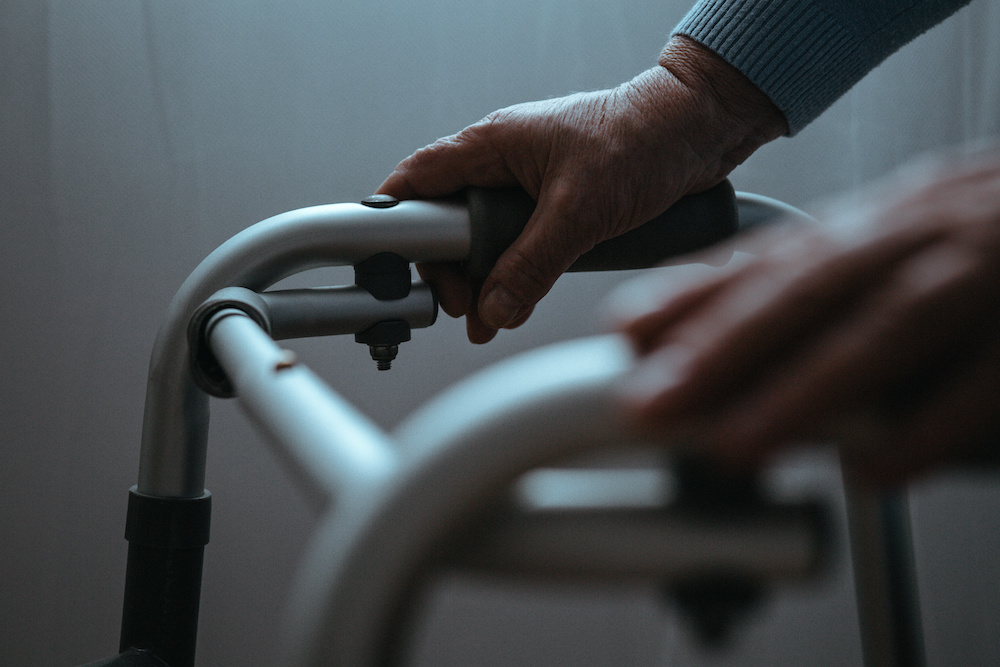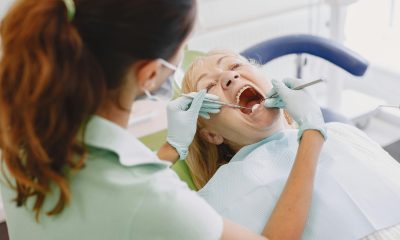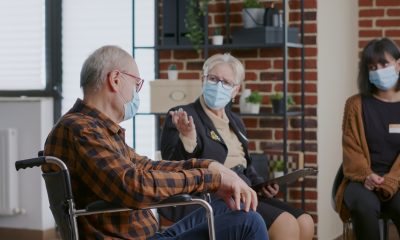Insights
At what point do dementia patients need 24-hour care?

The decision to move a family member with dementia into a care home is not easy. Agetech World explores when it’s the right time.
Being a family member of someone with dementia, it may become difficult to decide at what point they need 24-hour care.
A person with dementia will need more care and support as their condition progresses but it can be hard to know when the time is right and who should make this decision. The main thing to think about is whether the dementia patient’s needs are met at home; is moving into a care home in their best interest?
However, moving the person into a care home is not the only option: there are other options that would enable them to live at home while being assisted.
Here are some signs that may aid in deterring the right time for 24-hour care:
Aggressive behaviours

Aggressive behaviours should not be taken personally when it comes to dementia patients. This kind of behaviour is the response of the patient to the false signals generated in their brain or sometimes simply an attempt to communicate.
Aggressive behaviours can be one of the first signs for full-time care as it can become difficult for a singular carer or family member to control these behaviours on their own.
Patient’s safety

With dementia, judgement and memory become poor and the person becomes easily exposed to domestic accidents. To prevent this, patients start needing constant monitoring and 24-hour care becomes integral for home safety to such an extent that a person cannot even identify common hazards.
Caregiver stress

Alzheimer’s caregivers frequently report experiencing high levels of stress as it can be overwhelming to take care of a loved one with Alzheimer’s or other dementia.
It is not unusual that a dementia caregiver forgets to set boundaries, creates unrealistic and impractical expectations, and ends up burnt out. In addition to this, the overwhelming needs of the loved ones can make the caregiver frustrated and stressed.
The main symptoms of caregiver stress are denial, anger, social withdrawal, anxiety, depression, exhaustion, sleeplessness, irritability, lack of concentration and health problems.
Mobility issues

Dementia patients tend to be more mobile than in many other medical conditions. The effects of dementia can cause wandering which is defined as a clinical symptom characterised by frequent, repetitive, temporally confused behaviour manifesting as random.
But, dementia is likely to have a big physical impact on the person in the later stages of the condition. They may gradually lose their ability to walk, stand or get themselves up from chair or bed. They may also be more likely to fall.
Therefore, deciding when 24-hour care is needed is not an easy task and it differs from patient to patient. The decision must be made as a consequence of the advancing symptoms of the condition, keeping in mind the best interests of the patient, of the carer and of the family.
News
Agetech investment and innovation round-up

Global market to hit US$740bn in 2026, longevity needs lifts? ‘little brain’s’ big role, ageing ethics questioned…and more
IRISH insight and analysis company Research and Markets estimates the global ageing economy will surpass US$740bn this year.
These projections by the company, which is based next to the Guinness Brewery in Dublin, come in its latest paper, entitled: Longevity Market Report 2026-2036.
It takes a holistic view of the ageing economy encompassing consumer wellness, institutional healthcare, technology and regenerative medicine.
In a press release, accompanying the launch Research And Markets, say: “The longevity market is undergoing a structural shift, moving beyond predominantly consumer-driven wellness offerings toward institutionally funded healthcare solutions.
“Insurers, employers, health systems and pharmaceutical companies are increasingly integrating longevity-focused strategies to address the challenges of ageing populations, rising chronic disease burden and long-term cost sustainability.
“This evolution is accelerating demand for integrated platforms that enable early risk identification, targeted prevention and ongoing clinical engagement across the life course.”
Canadian researchers at McGill University say they have found a direct link between age‑related declines in the ‘little brain’ and worsening motor skills.
‘Little brain’ levers
Lead research author Eviatar Fields, a McGill doctoral student in the Integrated Program in Neuroscience, highlights how diminishing neuron activity in the cerebellum – at the base of the skull and known as the little brain – can impact gait, balance and agility.
The research pinpointed how changes in Purkinje cells – a key type of cerebellar neuron – drive this decline and translate into measurable changes in behaviour and physical function.
“By demonstrating how the changes that happen to Purkinje cells in age are causally linked to changes in gait, motor co-ordination and balance, our work provides new avenues for therapies that may prevent or delay motor aging.”
“This provides new hope for extending health span and ultimately improving quality of life and independence in elderly people,” said Mr Fields.
German lift company TK Elevator, is projecting a surge in demand as the global population ages and people find it increasingly difficult to use the stairs.
“As populations age – and that’s happening in Europe, it’s going to happen in China, everywhere else – there’s a need to put in elevators,” said Uday Yadav, its chief executive, speaking to the FT.
Longevity lifts
There are 22 million lifts worldwide, of which 30 per cent are more than 20 years old and potentially ripe to be refitted, he added.
TK Elevator, which was sold by German industrial conglomerate Thyssenkrupp to private equity firms Advent and Cinven for €17.2bn in 2020, is said to be looking at a potential €25bn market listing. Its revenues topped €9bn last year.
Researchers funded by the American Heart Association say the amino acid Taurine increased the life expectancy of mice, and monkeys by up to 25%.
Taurine is one of the most abundant amino acids within our bodies. It is secreted naturally and can be found in foods such as turkey, chicken, shellfish, and dairy.
It has the ability to lower blood pressure, act as an anti-inflammatory agent, and support cardiovascular health, but the concentration within human blood decreases as we age.
As well as longevity, the mice that were fed taurine exhibited improved bone density, muscle mass, pancreas function, and gut health.
Ethical questions
British GP and Medical Director Rammya Mathew has questioned the ethics of longevity highlighting how patients are being charged hefty sums of money ‘for investigations that are often unnecessary, of uncertain benefit, or unsupported by robust evidence’.
She added: “This is framed as empowering patients with knowledge, but it risks crossing the line into over-medicalisation of healthy people.”
The article published in the British Medical Journal continues: “I have watched this field with growing interest, particularly as an increasing number of high profile clinicians, some of whom have held senior roles in the NHS, move into private longevity medicine.
“Practising privately is not unethical in itself. But it does place doctors in an environment where the evidence base is often less clear, commercial pressures are more explicit, and the temptation to conflate innovation with benefit is real.”
Levels of the Nicotinamide Adenine Dinucleotide (NAD+) – a vital coenzyme found in every human cell – are the target of new research by the Nestlé Institute of Health Sciences.
The research published in the Nature Metabolism Journal indicates that certain NAD+ precursors can boost cellular energy levels and influence gut microbiome activity.
The study discovered that NAD+ precursors – nicotinamide riboside (NR), nicotinamide mononucleotide (NMN) increased circulating NAD+ concentrations.
NAD+ levels decline with age in multiple tissues – muscle, liver, brain and skin – by as much 65% from young adulthood to old age.
This contributes to hallmarks of aging like mitochondrial dysfunction, reduced energy production, impaired DNA repair, increased inflammation, and cellular senescence.
Ongoing research has shown that restoring NAD+ (via precursors) improves mitochondrial function, metabolic health, and resilience.
News
Centenarians’ blood reveals longevity clues

Centenarians’ blood contains 37 proteins linked to slower ageing, with profiles closer to younger adults than to octogenarians, according to new research.
In Switzerland, around 0.02 per cent of the population lives beyond 100.
As part of the SWISS100 project, researchers compared blood samples from centenarians, octogenarians and adults aged 30 to 60 to identify biological traits associated with exceptional longevity.
The study analysed three groups: 39 centenarians aged 100 to 105, of whom 85 per cent were women, 59 octogenarians and 40 younger volunteers.
Scientists measured 724 proteins in blood serum, including 358 inflammatory markers and 366 cardiovascular markers, both considered critical to longevity.
Of those 724 proteins, 37 showed a distinct pattern.
In centenarians, their levels more closely resembled those of the youngest group than those of octogenarians, representing around five per cent of the proteins measured.
The work was conducted by teams from the University of Geneva and the University of Lausanne as part of SWISS100, described as the first large-scale Swiss research project dedicated to centenarians.
The clearest findings involved five proteins linked to oxidative stress, a process caused by unstable molecules known as free radicals that can damage cells and are thought to accelerate ageing.
Free radicals mainly arise from chronic inflammation and malfunctioning mitochondria, the structures that produce energy within cells.
Centenarians had significantly lower levels of antioxidant proteins than the standard geriatric population, indicating they may generate fewer free radicals rather than relying on stronger antioxidant defences.
Among other findings, at least three proteins involved in regulating the extracellular matrix, the structural framework that supports cells, showed more youthful expression levels.
Some proteins may also play a role in tumour defence. Several proteins linked to fat metabolism rose sharply with age in the general older population but far less in centenarians.
Interleukin-1 alpha, a major inflammatory protein, was also lower in centenarians.
Levels of DPP-4, a protein that degrades GLP-1, a hormone that stimulates insulin secretion and forms the basis of newer diabetes and obesity treatments, remained well preserved in centenarians.
This may help maintain lower insulin levels and protect against hyperinsulinism and metabolic syndrome.
Flavien Delhaes, researcher at the department of cell physiology and metabolism at the University of Geneva Faculty of Medicine and first author of the study, said: “In our centenarians, the profiles of these 37 proteins are closer to those of the youngest group than to those of octogenarians.
“This represents approximately five per cent of the proteins measured, suggesting that centenarians do not entirely escape ageing, but that certain key mechanisms are significantly slowed down.”
On the DPP-4 finding, Delhaes said: “By degrading GLP-1, DPP-4 helps maintain relatively low insulin levels, which could protect them against hyperinsulinism and metabolic syndrome.
This is also a counterintuitive mechanism, suggesting that centenarians maintain good glucose balance without needing to produce large amounts of insulin.”
Karl-Heinz Krause, professor emeritus at the University of Geneva Faculty of Medicine, said: “Do centenarians produce fewer free radicals, or do they have a more powerful antioxidant defence?
“The answer is very clear: centenarians have significantly lower levels of antioxidant proteins than the standard geriatric population.
“At first glance, this seems counterintuitive, but in reality, it indicates that since oxidative stress levels are significantly lower in our centenarians, they have less need to produce antioxidant proteins to defend against it.”
The researchers noted that genetic factors account for around 25 per cent of longevity, suggesting adult lifestyle plays a major role.
They highlighted nutrition, physical activity and social connections, noting that eating fruit can reduce oxidative stress during the day, regular movement supports the extracellular matrix, and maintaining a healthy weight helps preserve metabolic health similar to that observed in centenarians.
Research
Interview: The US company appealing Europe’s rejection of daily Alzheimer’s pill

Despite having its application for a new, daily Alzheimer’s pill rejected by Europe’s regulators the CEO of US drug company Anavex Life Sciences is appealing this decision.
A Phase IIb/III trial found over one-third of patients with mild Alzheimer’s – those with a Mini-Mental State Examination (MMSE) score of between 20 and 28 – experienced a slowing of their ‘cognitive decline’.
And, for the majority of the population – those with the common sigma-1 gene – the results were even more dramatic, slowing decline by 49.8%.
Despite this success, in December last year, the European medical authorities rejected an application for the drug – known as Blarcamesine – saying the study ‘failed to demonstrate effectiveness and safety’.
Within days Anavex initiated a challenge to the decision. It has called for a re-examination of the evidence and this is now being undertaken by the European Medicines Agency (EMA).
Speaking to Agetech World Dr Christopher Missling, president and CEO of Anavex, said: “The trial data showed that patients actually improved their quality of life.
“The Alzheimer’s patients had a higher quality of life at the end of the trial than at baseline.”
What Is Blarcamesine?
Unlike other treatments targeting Alzheimer antagonists, such as amyloid-beta or tau pathology, Blarcamesine acts upstream by activating sigma-1 receptors.
This permits the restoration of autophagy – the intracellular recycling and cleaning system which is impaired in pathologies such as Alzheimer’s.
Alzheimer treatments such as Leqembi – which has been approved in over 50 counties and targets amyloid-beta plaques in the brain to slow Alzheimer progression – require regular hospital infusions and carry the risk of brain swelling and bleeding.
Blarcamesine is a pill, taken orally, with no evidence of damaging side effects, such as brain swelling or micro-bleeding, eliminating the need for frequent MRI monitoring required for other drugs.
Dr Missling said: “None of this would be required with Blarcamesine, which is a once-daily, simple oral pill you can ship anywhere.
“The efficacy is also extremely favourable; we see a double or more benefit of cognition and function compared to those injectable antibodies. So, it potentially offers a strong advantage not only in safety and convenience but also in efficacy.”
Why was it rejected by the EU?
A statement from the EMA outlined its position: “In December 2025, EMA’s human medicines committee, the Committee for Medicinal Products for Human Use (CHMP), concluded that the main study failed to demonstrate effectiveness and safety of Blarcamesine Anavex in patients with early Alzheimer’s disease who do not have a mutation in the sigma-1 gene.”
It went on to say that Anavex has requested a ‘re-examination of EMA’s opinion issued on December 11, 2025…(and) the agency will re-examine its opinion and issue a final recommendation’.
Concerns raised by the CHMP focused on trial methodology, possible side effects in the nervous system, and impurities that could potentially cause cancer.
Dr Missling highlighted how a lengthening of the titration process had addressed the mild-dizziness issue and the impurity concerns, which centred on an acceptable threshold for nitrosamines, has also been negated.
And, he highlighted how the amyloid-beta plaque-targeting drugs Leqembi and Kisunla – which have been fully approved in the US – were eventually approved in Europe after a similar re-examination process .
USA application
Anavex has started a dialogue with the US Food and Drug Administration which has requested access to all of its trial data and if approved in the USA it will open-up the potential for global market authorisation.
The potential size of the market for Blarcamesine is huge, with the number of adults suffering from Alzheimer’s disease expected to grow from around 60 million to 150 million by 2050, as the global population ages.

Dr Missling on how Blarcamesine works
“Blarcamesine activates the Sigma-1 receptor in vivo, which has been confirmed in several peer-reviewed publications and established with a PET study demonstrating dose-dependent activation in the brain.
“The sigma-1 is an integral membrane protein involved in restoring cellular homeostasis. It activates an upstream compensatory process – autophagy – through sigma-1 activation.
“Autophagy gets impaired over time during aging and especially during pathologies like Alzheimer’s and Parkinson’s. This is a very important process, which is nothing else but the recycling of neurons who cannot get rid of their ‘trash’, if you like; they have to recycle it. If this mechanism is impaired, those cells eventually die.
“It stands at the top of many cascades of this complex pathology, for example, on top of A-beta aggregation or Tau aggregation.
“That’s why it’s intriguing to try to approach this from a more comprehensive upstream viewpoint.
Blarcamesine is a small molecule you can take once a day. It restores homeostasis, reactivates impaired autophagy, and lets the body function as it does in a healthy fashion.”

 Research3 days ago
Research3 days agoInterview: The US company appealing Europe’s rejection of daily Alzheimer’s pill

 Research4 weeks ago
Research4 weeks agoInterview: Dr Annu Navani on biotechnology and ‘the power to recode life itself’

 Insights4 weeks ago
Insights4 weeks agoDentordu: Digital dentistry for healthier ageing

 News4 weeks ago
News4 weeks agoStudy shows clear link between CTE and dementia risk

 Wellness4 weeks ago
Wellness4 weeks agoATW’s research round-up: new Alzheimer trigger identified, UK university targets longevity. fibre not protein?…and more

 Wellness4 weeks ago
Wellness4 weeks agoStudy confirms gut inflammation link to Alzheimer’s

 News4 weeks ago
News4 weeks agoDementia driving hospital discharge delays, new data shows

 News4 weeks ago
News4 weeks agoAssisted dying should be ‘gradually’ extended to dementia, author Ian McEwan says





























